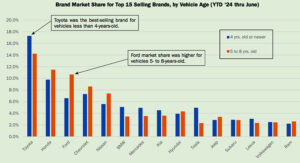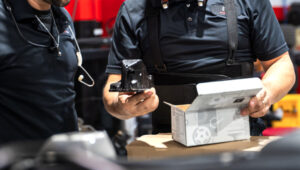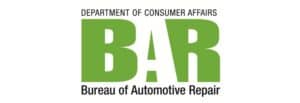CAA continues to review, monitor and report on bills as they make their way through the legislative process — here’s the latest on where they stand
Sacramento, Calif.—The State Legislature began the year with more than 2,600 new bills, and as the session moves forward, the California Autobody Association (CAA) is monitoring the bills, including amendments, and will add to the list. Here’s the CAA’s breakdown of where bills presently stand.
Bureau of Automotive Repair
• AB 1263 — Bureau of Automotive Repair – Support. High priority. This bill, among other things, would maintain the continuation of the BAR Advisory Committee; require employees, such as service writers, who are involved in a BAR violation to attend remedial training; require a salvage rebuilder selling a revived salvage vehicle to provide a consumer with a safety systems certificate and require upcoming BAR towing and storage regulations to reference the civil and vehicle codes and insurance code regulations. Status: Senate Floor.
Catalytic Converter Theft Bills
• AB 641 — Catalytic Converters — Watch. Makes it a misdemeanor for someone to possess 9 or more used catalytic converters that have been cut from a vehicle unless they are a licensed dismantler. Status: Assembly Floor.
• AB 1519 — Catalytic Converters — Concerns. Makes it a misdemeanor to remove, alter or obfuscate any VIN engraved, etched or otherwise marked on a catalytic converter, or from possessing 3 or more catalytic converters that have been so altered. Status: Senate Floor.
• SB 55 — Watch. Prohibits a motor vehicle dealer from selling a vehicle equipped with a catalytic converter unless the converter has been permanently marked with the VIN, the vehicle is sold for dismantling or salvage, the vehicle is sold at a wholesale auction or a buyer declines the marking offered by the dealer. Status: Governor’s Desk.
Career Technical Educational
• AB 377 — Career Tech Education — Support. Increases Career Technical Education funding from $300 million each year to $450 million. Status: Held in Senate Appropriations Committee. Two-year bill.
Employment
• AB 518 – Paid Family leave — Watch. Expands the definition of “family member” for purposes of the Paid Family Leave Program to allow workers to take time off to care for a seriously ill designated person. Status: Senate Floor.
• AB 524 — Family Caregiver — Concerns. Adds caregiver status as a protected class under the Fair Employment and Housing Act. Status: Senate Floor.
• AB 1100 — Employment Workweek — Concerns. Establishes the 32-hour workweek pilot program. Status: Assembly — Two-year bill.
• SB 365 — Arbitration — Concerns. Prohibits automatic staying of civil legal proceedings during the pendency of denial or dismissal of a petition to compel arbitration. Status: Governor’s Desk.
• SB 399 — Employer Communications. Concerns. Enacts the California Worker Freedom from Employer Intimidation Act. Status. Held in Assembly Appropriations Committee. Two-year bill.
• SB 616 — Paid Sick Days — Concerns. Modifies employer sick leave and requires an employee have no less than 40 hours of accrued sick leave. Status: Assembly Floor.
• SB 703 — Support. Permits a nonexempt employee to request a flexible work schedule providing up to 10 hours per day within a 40-hour workweek without obligation to pay overtime. Status: Senate — two-year bill.
• SB 799 — Concerns. Unemployment Benefits. Allows employees involved in a trade dispute to collect unemployment insurance benefits. Status. Assembly Floor.
Hazardous Waste
• AB 407 — Used Oil — Watch. This bill clarifies how material that is exempted from hazardous waste regulation as a used oil under state law can be managed. Status: Senate Floor.
• AB 493 — Relates to the California Oil Recycling Enhancement Act. Watch. Status: Two-year bill.
• AB 1614 – Gas Fueling Stations – Concerns. Requires California Energy Commission to conduct a study on how to phase out the existence of gas fueling stations. Status: Senate Floor.
• AB 1716 — Hazardous Waste Management — Watch. Make various technical changes to the six unified hazardous waste and materials management regulatory program that are overseen by the Certified United Programs Agencies (CUPAs). Status: Governor’s Desk.
Vehicle Batteries
• AB 1579 — Vehicle Batteries — Watch. Requires the state, beginning in 2035, to establish a bid specification for the acquisition of motor vehicles and determining the lowest bidder to consider whether the vehicle is equipped with lithium-ion batteries produced with the least environmental impact. Status: two-year bill
• SB 615 — Electric Batteries — Concerns. Requires an automotive repair dealer that removes a battery from a vehicle that is still in service to participate in a core exchange program established by the battery supplier and be responsible for either returning a removed battery to the battery supplier or sending it to a qualified facility. Status: two-year bill.
Zero Emissions Aftermarket
• SB 301 — Zero-Emission Aftermarket — Watch. Requires CARB to establish the Zero Emissions Aftermarket project to provide an applicant with a rebate for a vehicle that has been converted to a zero-emission vehicle. Status: Assembly Floor.
Other Bills of Interest
• AB 473 — New Motor Vehicle Board — Watch. Modifies several laws governing relationships between new motor vehicle manufactures and franchisees that operate car dealerships. Status: Governor’s Desk.
• AB 1609 — Air Pollution. Concerns. Imposes an additional annual $4.00 charge on motor vehicles to provide funding for air quality management districts to reduce air pollution. Status: Two-year bill.
• SB 12 — Greenhouse Gas Emissions — Watch. Requires CARB to ensure that statewide greenhouse gas emissions are reduced by at least 55% below 1990 levels by December 31, 2030. Status: two-year bill.
• SB 429 — Transportation Network Companies — Watch. Establishes vehicle inspection requirements for vehicles used on a Transportation Network Company platform such as Uber and Lyft. Status: Assembly Floor.
• SB 670 — Vehicle Miles Traveled — Concerns. Requires CARB to develop a methodology for assessing and spatially representing vehicle miles traveled and to develop maps to display average vehicle miles traveled per capita in the state. Status: Senate – Two-year bill.















Comments are closed.